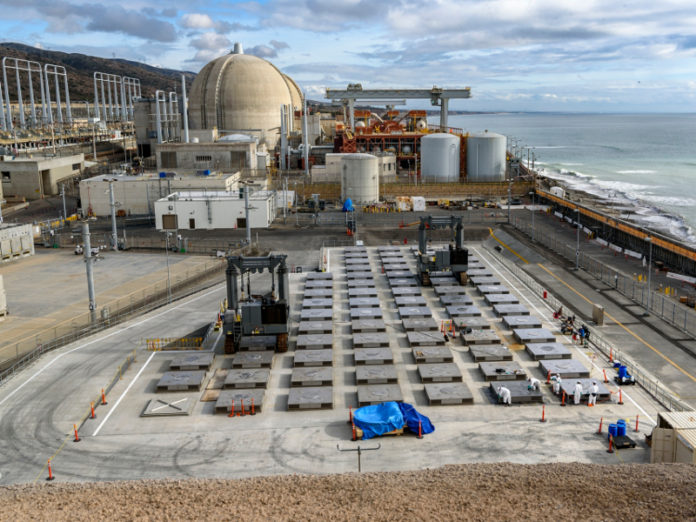Washington, D.C. – Today, U.S. Representatives Mike Levin (D-CA) and Darrell Issa (R-CA) reintroduced the Spent Fuel Prioritization Act to prioritize the removal of spent nuclear fuel (SNF) from decommissioned nuclear sites in areas with large populations, high seismic hazard, and where the continued storage of spent nuclear fuel represents a national security concern. With over nine million people living within 50 miles of the San Onofre Nuclear Generating Station (SONGS) and Southern California experiencing some of the greatest seismic hazard in the country, as well as its location on Marine Corps Base Camp Pendleton, the bill would make SONGS one of the highest priority sites in the nation for SNF removal. The bill is also cosponsored by Reps. Scott Peters (D-CA), Michelle Steel (R-CA), Katie Porter (D-CA), and Young Kim (R-CA).
“Since I was first sworn into Congress, one of my top priorities has been protecting my constituents and our environment from the risks associated with the spent nuclear fuel at San Onofre,” said Rep. Levin. “With its location on the Marine Corps’ largest West Coast base, millions of people living in the area, earthquake fault lines running through the region, and rising sea levels threatening San Onofre, it is imperative that we move the waste from our community as quickly and safely as possible. We’ve made incredible progress in the last several years to advance the consent-based siting process at the Department of Energy. Now it’s time to pass this legislation and make the commonsense decision to prioritize particularly sensitive sites like San Onofre for the removal of spent nuclear fuel.”
“Federal action on spent fuel storage at the now-closed San Onofre Nuclear Generating Station is long overdue, and disposal of power plant waste continues to be needlessly delayed by a process that lacks a commitment to a workable solution,” said Rep. Issa. “That’s why our bipartisan legislation should serve as a model in Congress and demonstrate that consensus is possible.”
“Moving spent nuclear fuel away from highly populated areas, particularly those prone to earthquakes, should be a priority. Despite the comprehensive and proactive measures the federal government has taken to ensure the site’s security, this kind of onsite storage is an unsustainable option,” said Rep. Peters. “This bill takes commonsense steps to prioritize sensitive areas like San Onofre when removing spent fuel to a long-term facility. We need durable, permanent storage solutions for our nation’s nuclear waste.”
“The San Onofre site has unique risk being close to the ocean, near densely populated residential areas, and in an earthquake zone. It is critical that we prioritize a long-term solution for this spent fuel,” said Rep. Steel. “The Spent Fuel Prioritization Act is a commonsense solution to protect our community, environment, and national security. As a founding member of the Spent Nuclear Fuels Caucus, I am proud to join my Southern California colleagues in introducing this bill.”
“Rep. Levin and I understand the risk that comes with active fault lines running through California,” said Rep. Porter. “More than nine million Californians live within 50 miles of the San Onofre Nuclear Generation Station and its spent nuclear fuel, and that poses a real threat to our communities in the event of an earthquake. Prioritizing the removal of sensitive waste from regions with large populations and significant seismic hazard, like Southern California, helps keep our country safe.”
“It is important to avoid risk for large population centers and military facilities when coordinating the removal and storage of spent nuclear fuel. This is especially important for Southern Californians, as the San Onofre Nuclear Generating Station in the event of an earthquake poses a hazardous risk to the millions of citizens living in Orange County, surrounding areas, and Camp Pendleton’s facilities,” said Rep. Kim. “The Spent Fuel Prioritization Act is critical to protect our communities from hazardous waste and support long term solutions for the safe storage of spent nuclear fuel. I’m proud to join in this bipartisan effort.”
The Spent Fuel Prioritization Act would require the Department of Energy (DOE) to prioritize the removal of SNF from nuclear power plants based on the size of the population near the plant, seismic hazard associated with the area, and any national security concerns. The bill would add this requirement to the codified Nuclear Waste Policy Act (NWPA). The bill does not favor a permanent repository or consolidated interim storage, and does not authorize the transfer of spent fuel to any non-consenting state or locality.
Representative Levin has been a longtime advocate for increased transparency, accountability, and oversight at SONGS and for solutions to move the hazardous waste at San Onofre out of the region. In March 2020, Rep. Levin called on the House Appropriations Committee to fund a consolidated interim storage program at the DOE. Further, the letter stated that DOE’s program should initially focus on accepting fuel from closed nuclear plants while accounting for site-specific environmental factors. Both of these criteria favor removing fuel from the San Onofre Nuclear Generating Station and align with Rep. Levin’s Spent Fuel Prioritization Act. In December 2020, Rep. Levin voted for bipartisan government funding legislation that included the $20 million for the interim storage of spent nuclear fuel, as was requested in Rep. Levin’s letter. That legislation was subsequently signed into law, and funding under the law enabled the DOE to restart the consent-based siting process last November.
One of Representative Levin’s first actions as a Member of Congress was to launch a task force made up of local stakeholders and experts to address the safety challenges at SONGS and formulate federal policy recommendations to address the hazardous waste. The task force report is available here. Rep. Levin also formed a bipartisan Congressional Spent Nuclear Fuel Solutions Caucus to address the challenges associated with stranded commercial spent fuel across the country.


















